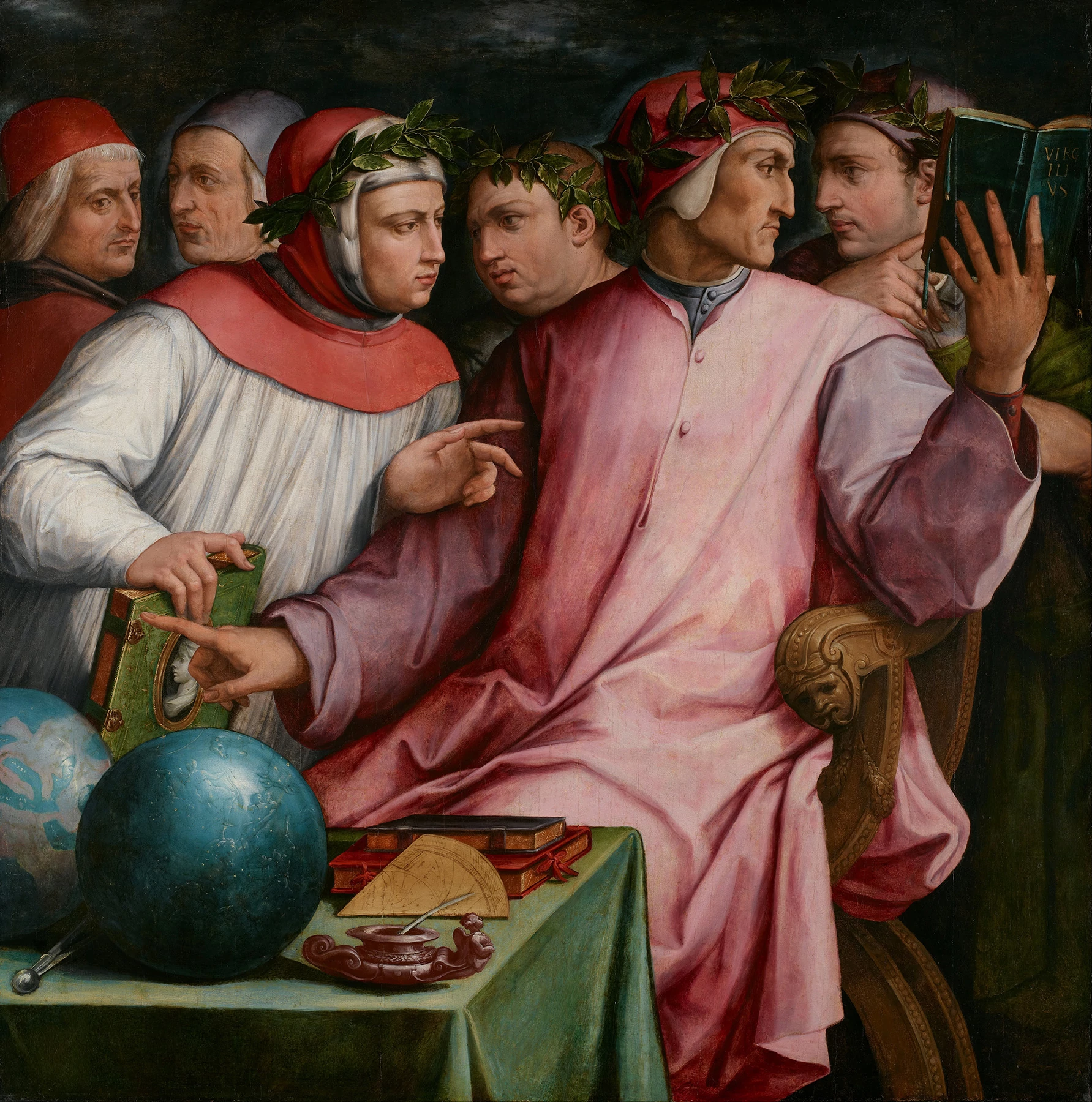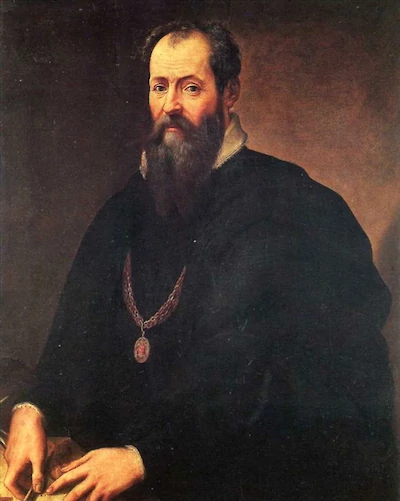

Giorgio Vasari
The first art historian
1511 – 1574NOW IN THE YEAR 1276, in the country of Florence, about fourteen miles from the city, in the village of Vespignano, there was born to a simple peasant named Bondone a son, to whom he gave the name of Giotto, and whom he brought up according to his station. And when he had reached the age of ten years, showing in all his ways though still childish an extraordinary vivacity and quickness of mind, which made him beloved not only by his father but by all who knew him, Bondone gave him the care of some sheep. And he leading them for pasture, now to one spot and now to another,was constantly driven by his natural inclination to draw on the stones or the ground some object in nature, or something that came into his mind. One day Cimabue, going on business from Florence to Vespignano, found Giotto, while his sheep were feeding, drawing a sheep from nature upon a smooth and solid rock with a pointed stone, having never learnt from any one but nature. Cimabue, marvelling at him, stopped and asked him if he would go and be with him. And the boy answered that if his father were content he would gladly go. Then Cimabue asked Bondone for him, and he gave him up to him, and was content that he should take him to Florence.
There in a little time, by the aid of nature and the teaching of Cimabue, the boy not only equalled his master, but freed himself from the rude manner ofthe Greeks, and brought back to life the true art of painting, introducing the drawing from nature of living persons, which had not been practised for two hundred years; or at least if some had tried it, they had not succeeded very happily. Giotto painted among others, as may be seen to this day in the chapel of the Podestà’s Palace at Florence, Dante Alighieri, his contemporary and great friend, and no less famous a poet than Giotto was a painter.
After this he was called to Assisi by Fra Giovanni di Muro, at that time general of the order of S. Francis, and painted in fresco in the upper church thirty-two stories from the life and deeds of S. Francis, which brought him great fame. It is no wonder therefore that Pope Benedict sent one of his courtiers into Tuscany to see what sort of a man he was and what his works were like, for the Pope was planning to have some paintings made in S. Peter’s. This courtier, on his way to see Giotto and to find out what other masters of painting and mosaic there were in Florence, spoke with many masters in Sienna, and then, having received some drawings from them, he came to Florence. And one morning going into the workshop of Giotto, who was nat his labours, he showed him the mind of the Pope, and at last asked him to give him a little drawing to send to his Holiness. Giotto, who was a man of courteous manners,immediately took a sheet of paper, and with a pen dipped in red, fixing his arm firmly against his side to make a compass of it, with a turn of his hand he made a circle so perfect that it was a marvel to see it Having done it, he turned smiling to the courtier and said, “Here is the drawing.". But he, thinking he was being laughed at, asked, “Am I to have no other drawing than this?” “This is enough and too much,” replied Giotto, “send it with the others and see if it will be understood.” The messenger, seeing that he could get nothing else, departed ill pleased, not doubting that he had been made a fool of. However, sending the other drawings to the Pope with the names of those who had made them, he sent also Giotto’s, relating how he had made the circle without moving his arm and without compasses, which when the Pope and many of his courtiers understood, they saw that Giotto must surpass greatly all the other painters of his time. This thing being told, there arose from it a proverb which is still used about men of coarse clay, “You are rounder than the O of Giotto,” which proverb is not only good because of the occasion from which it sprang, but also still more for its significance, which consists in its ambiguity, tondo, “round,” meaning in Tuscany not only a perfect circle, but also slowness and heaviness of mind.
So the Pope made him come to Rome, and he painted for him in S.Peter’s, and there never left his hands work better finished; wherefore the Pope, esteeming himself well served, gave him six hundred ducats of gold, besides having shown him so many favours that it was spoken of through all Italy.
After Giotto was returned to Florence, Robert, King of Naples, wrote to his eldest son, Charles, King of Calabria, who was at that time in Florence, that he must by some means or other send him Giotto to Naples. Giotto, hearing himself called by a king so famous and so much praised, went very willingly to serve him, and did many works which pleased the king greatly. And he was so much beloved by him that the king would often visit him, and took pleasure in watching him and listening to his conversation, and Giotto, who had always some jest or some witty answer ready, would converse with him while going on with his painting. So one day the king saying to him that he would make him the first man in Naples, Giotto answered, “And that is why I am lodged at the Porta Reale, that I may be the first man in Naples.” And another time the king saying to him, “ Giotto, if I were you, now that it is hot, I would give up painting a little.” He answered, “And so would I, certainly, if I were you.”
So pleasing the king well, he painted him a good number of pictures, and the portraits of many famous men, Giotto himself among them; and one day the king, as a caprice, asked him to paint his kingdom. Giotto, it is said, painted a laden ass with a new load lying at his feet, which while it refused it seemed to desire, and both on the new and old burden was the royal crown and sceptre of power. And when Giotto was asked by the king what the picture signified, he replied, “Such must be the subjects and such the kingdom which every day desired a new lord.”
There are many other stories remaining of the witty sayings of Giotto, and besides those that are told by Boccaccio, Franco Sacchetti tells many good ones, some of which I will give in Franco’s own words.
How a man of low station gives Giotto the great painter a shield to paint.
“Every one must have heard of Giotto, who was a great painter above any other. A rough workman, hearing of his fame, came to Giotto’s workshop followed by one carrying his shield. Arrived there, he found Giotto, and said, ‘God save you, master, I want you to paint my arms on this shield.’ Giotto, considering the man and his manner of speech, said nothing but, ‘When do you want it?’ And he told him. Giotto said, ‘Leave me to do it;’ so he went away. And Giotto, left alone, said to himself, ‘What did he mean? Has some sent him for a joke? I never had a shield to paint before. And this man was a simple fellow, and bade me paint his arms as if he were of the royal house of France. Certainly I shall have to make him some new arms.’ So considering the matter, he put the shield before him and made a design and bade one of his pupils paint it, and so it was done. There was a helmet, a gorget, a pair of iron gloves, a cuirass, and cuisses, a sword, dagger, and lancc. So the worthy man came again and said, ‘Master, is my shield painted?’ Giotto answered, ‘Certainly, bring it down.’ But when it came the would-be gentleman looked at it and said, ‘What is this you have been painting ? I won't pay four farthings for it.’ Giotto said, ‘What did you tell me to paint?’ And he answered, ‘My arms.’ ‘ Are not they all here?’ asked Giotto; ‘what is wanting? Nay, you are a great fool, for if any one were to ask you who you are, you would hardly know what to answer; and you come here and say, Paint me my arms. What arms do you bear? Whence are you? Who were your ancestors? I have painted all your armour on the shield, and if there is anything else, tell me and I will add it.’ But the other answered, ‘You are giving me vile words, and have spoilt my shield.’ And he went away and summoned Giotto before the justice. Giotto appeared, and on his side summoned him, demanding two florins for his painting. And when the court had heard the matter, they gave sentence that the man should take his shield so painted, and pay six lire to Giotto.”
It is said that when Giotto was only a boy with Cimabue, he once painted a fly on the nose of a face that Cimabue had drawn, so naturally that the master returning to his work tried more than once to drive it away with his hand, thinking it was real. And I might tell you of many other jests played by Giotto, but of this enough.